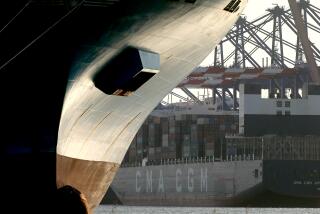Noncompetitive Merger Exacts a High Price
The concern expressed here a year ago over the $5.4-billion merger of Union Pacific and Southern Pacific railroads lay in the details. Now, it turns out, had those details been given closer consideration the current delays in moving freight on what has become the nation’s largest railroad might have been avoided, at least in part.
Union Pacific provides the rail hub for the movement of goods in and out of the nation’s busiest ports, Los Angeles and Long Beach. The merged railroad, it was predicted, would also carry 80% of all traffic to and from Mexico and 75% of the petrochemical goods produced along the American Gulf Coast. That made the merger a matter of national significance.
The Justice Department saw that and properly said the merger should be contingent on the sale of specific sections of track to competitors. Transportation Department officials warned that several regions could suffer from a loss of rail competition under the UP/SP deal. The Agriculture Department had similar concerns about the movement of agricultural goods for shipment abroad.
But the federal Surface Transportation Board, which approves such deals, set surprisingly few stipulations for a railroad about to absorb such awesome responsibilities. Now federal regulators call the near-paralysis of the UP/SP system “a transportation emergency” exacerbated by a “fundamental breakdown” in safety.
Cargo is stacking up at Los Angeles and Long Beach harbors, forcing huge retailers like Kmart, Sears and Pier 1 to reroute incoming cargoes to other ports. That hurts the Southern California economy, and UP is facing similar complaints from corporate customers throughout its system.
Now the Surface Transportation Board has ordered Union Pacific to open a portion of its Houston business to competitors for at least a month. High time, but it’s still not good enough. Such solutions ought to be considered for other parts of the UP network as well. Competition is the key to better performance. Meanwhile, UP should provide more crews and trains in the West.
Union Pacific officials say they are making progress on the problems and blame the troubles in part on a huge increase in trade. Those officials claim they can have things under control by Thanksgiving; they should be held to that target.
There will be no lack of pressure on the railroad and the Surface Transportation Board. Retailers, shippers and local governments will apply the squeeze as they tally up the delays and losses laid to a promise unkept.
More to Read
Sign up for Essential California
The most important California stories and recommendations in your inbox every morning.
You may occasionally receive promotional content from the Los Angeles Times.









